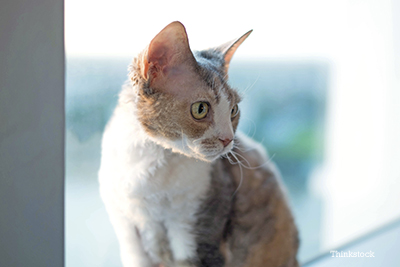

Every day you probably see or hear at least one advertisement promoting human products to ‘protect digestive health’ or to ‘resolve bloating and to keep you regular.’ Colon regularity seems to be a real celebrity cause these days, but did you know that your cat is also prone to bouts of irregularity? Did you know that constipation in cats can, over time, become a serious, life-threatening problem?
Depending on your cat’s bathroom habits, you may or may not even be aware of how ‘regular’ he is. If your cat is free-roaming outside, you may not be in a position to monitor his bowel movements.
[Editor’s Note: This is another reason why we recommend keeping your cat indoors at all times.]
If you are cleaning a litter pan every day, odds are you will notice whether or not your cat is eliminating daily and whether his stools are large or small, hard or soft. Armed with this information, it’s your job to notice if your cat is developing constipation.
Symptoms of constipation in cats include:
- Difficulty passing stools and/or straining to defecate: Note that straining can be pretty general and can easily be confused with difficulty urinating (or vice versa). While the inability to pass stool is uncomfortable and over time can become a very serious problem, the inability to urinate is always an urgent, emergency situation; you should seek veterinary assistance immediately if your cat is straining and uncomfortable.
- Hard, small stools: Even if you cat is having bowel movements on a routine basis, if those stools are small, hard or dry that is still an indication that there is a problem
- No stools at all
- Small amounts of liquid stool: This may seem counterintuitive, but if your cat is only passing small amounts of liquid it may be because he is so constipated that the immoveable, hard, mass of stool is blocking the passage of anything but little bits of liquid.
- Decreased appetite/activity/depression
- Vomiting: Vomiting can occur simply because of feeling too ‘full’ but also typically occurs as a result of forceful (especially non-productive) straining to expel feces
Causes of constipation in cats and treatments
- Dehydration is an extremely common cause of constipation, especially in cats. This can occur because many cats don’t drink much to begin with, but it can also occur secondary to other illnesses; especially in situations where your cat simply cannot drink enough (fevers or kidney disease may cause this). Fluid therapy (oral, dietary, or medical) may be indicated in these situations.
- Dietary issues often cause constipation. Either because of too much fiber, too little fiber or too little liquid in your cat’s diet. Your veterinarian can help to decide what diet is best suited to offer your cat relief.
- Discomfort (from arthritis for instance) can also affect your cat’s bathroom habits and make him less eager to have a bowel movement. In those cases, medications for pain or joint health may help.
- Obstructions can limit the movement of stool. Obstructions, including a narrowed pelvic canal from a prior injury, anal gland disorders, tumors or even (rarely) prostatic enlargement can all affect movement. Your veterinarian may recommend XRays and/or ultrasound imaging to rule these factors in or out of the equation.
- Motility disorders can diminish the function of the muscles in the colon, causing constipation. If the muscles don’t contract normally then the stool doesn’t move, the colon wall has to stretch beyond its natural limits, and then it is even harder for the colon to function, creating a vicious cycle that can ultimately result in your cat needing enemas in the short term or even a major surgery to reduce the size of his colon in the long run.
See your veterinarian if you have any concerns at all about your cat’s bowel movements. Your veterinarian can evaluate your cat’s situation and make specific recommendations about dietary management, the use of stool softeners, and any indication for motility medications. It may take some trial and error to find what works best for your cat, and you will probably have to make changes to the treatment plan as time goes on. Work with your veterinarian to keep on top of the problem.
The take home message here is that time is of the essence—not because one little bout of irregularity or constipation is going to create a serious, irreversible problem—but because regular bowel movements are important (whether a celebrity tells you that or not), especially for your cat. Early acknowledgement of the problem allows for timely intervention and the ability to effectively adjust accordingly in order for a better ‘outcome.’
If you have any questions or concerns, you should always visit or call your veterinarian -- they are your best resource to ensure the health and well-being of your pets.
